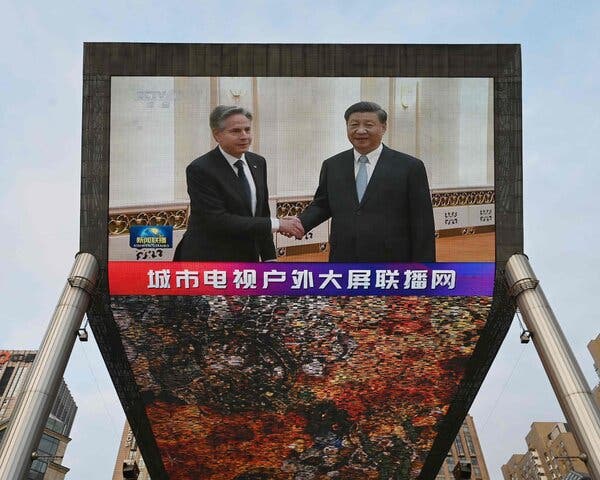Your Tuesday Briefing: Xi and Blinken Meet

Xi meets with Blinken
Antony Blinken, the U.S. secretary of state, met with Xi Jinping, China’s leader, as the two countries try to pull relations out of a deep chill that has raised global concerns about the growing risk of a conflict between them. The talks show that both countries recognize the stakes of their rivalry.
Xi’s decision to meet with Blinken indicated that he was uncomfortable with the escalation in tensions. He struck a congenial note at the top of their 35-minute meeting, praising the two sides for making progress on some unspecified issues during Blinken’s two-day visit to China.
“This is very good,” Xi said. But he also hinted at grievances, saying that he hoped Blinken would “make more positive contributions to stabilizing China-U.S. relations.”
Blinken, who is the first American secretary of state to visit Beijing since 2018, said that he pushed for “direct engagement and sustained communication at senior levels.” He said that he pressed China to open a military-to-military communications channel — which the U.S. argues is critical for avoiding crises in the seas and airspace around China — but was rebuffed.
The Blinken-Xi meeting could set the stage for a meeting between Xi and President Biden. But it is unclear whether high-level diplomacy can change the trajectory of relations.
Differences: The rivals also sought to demonstrate that they were not compromising on core issues. Their disagreements include Taiwan, the Chinese military’s growing footprint, the development of advanced technologies, Russia’s war in Ukraine and human rights.
The view from China: Pressure may be mounting on Beijing to stabilize ties because of China’s worsening economy. Xi may also want to steady the relationship because he appears eager to cast himself as a global statesman.
Other diplomacy: Germany and China will restart government consultations this week after a three-year pandemic hiatus.
A Russian assassination attempt
In 2020, Russia tried to assassinate a C.I.A. informant on U.S. soil, appearing prepared to cross a line that the country had previously avoided. The failed plot represented a brazen expansion of President Vladimir Putin’s campaign of targeted assassinations and led, in part, to expulsions of the C.I.A.’s chief in Moscow and his Russian counterpart in Washington.
The informant, Aleksandr Poteyev, had been a Russian intelligence official more than a decade earlier. He had disclosed information that led to a yearslong F.B.I. investigation that, in 2010, ensnared 11 Russian spies living under deep cover on the East Coast. The U.S. arrested and expelled 10 of the 11 Russian spies.
Putin had long vowed to punish Poteyev, who was resettled in Miami by the C.I.A. under a program meant to protect former spies. After Poteyev used his real name to get a fishing license and register as a Republican so he could vote, Russia coerced a Mexican scientist to try to find him. But the scientist botched the operation, was arrested and then provided details of the plan to U.S. investigators.
Other Russia and Ukraine news:
-
Aleksei Navalny, Russia’s opposition leader, faces new extremism charges that could add 30 years to his sentence.
-
Many of the arms donated to Ukraine by other countries are so decrepit that they were deemed fit only for spare parts. Ukraine has also paid hundreds of millions of dollars for weapons that have not been delivered.
New Zealand’s housing crash
The coronavirus pandemic disrupted housing markets across the world, but few countries have experienced as wide of a swing as New Zealand, which slipped into a recession last week.
House prices there soared almost 50 percent during the pandemic as people took advantage of low mortgage rates and relaxed lending rules. But in November 2021, the central bank began one of the most aggressive rate-tightening cycles in the world to tackle rising inflation.
Since then, prices have fallen 17.5 percent, eradicating more than $6 billion in household wealth, according to some estimates.
Background: Housing has traditionally been in short supply and of poor quality. Homes in New Zealand are among the least affordable in the world.
Politics: The housing crisis is at the top of the agenda ahead of national elections this year. Calls to address the problem grew more urgent in February, when major storms and flooding damaged thousands of homes on North Island.
THE LATEST NEWS
Around the World
-
At least five Palestinians died in a gun battle between Israeli forces and Palestinian militants in the occupied West Bank.
-
Rescuers are searching for a tourist submersible that disappeared near where the Titanic sank. Five people were on board.
-
Pakistan held a day of mourning yesterday to honor its citizens who died when a migrant boat capsized near Greece last week.
-
North Korea’s top leaders “bitterly criticized” officials responsible for a failed launch of a military satellite last month, state media said. The launch set off an evacuation order in Seoul.
Sports News
-
The American golfer Wyndham Clark won the U.S. Open by one stroke, beating Rory McIlroy of Northern Ireland.
-
A contract between Lionel Messi and Saudi Arabia’s tourism authority offers a glimpse at the details of their multimillion-dollar relationship.
A Morning Read
In the musical “The Light in the Piazza,” two tourists travel to Italy during the 1950s. In a revival, a theater company in New York has cast Asian actors in two main roles. The move is an effort to emphasize the musical’s exploration of the otherness — an otherness that some Asian Americans often feel.
ARTS AND IDEAS
Buenos Aires’s booming restaurant scene
Inflation in Argentina has passed 100 percent and the street value of the peso has crumbled, dropping about 25 percent over just a three-week period in April.
One surprising side effect: The restaurant scene in Buenos Aires is flourishing. Middle- and upper- class people are eating out to get rid of their pesos quickly, before they lose more value. In April, restaurant attendance there was 20 percent higher than at its highest point in 2019, before the coronavirus pandemic began. Restaurateurs and chefs are plunging their revenues back into new restaurants.
But the boom, in a way, is a facade. Even though people in the capital appear to be out having a good time, they do not know if their money will be worth anything tomorrow. And in much of the country, many regular people are just scraping by.
PLAY, WATCH, EAT
What to Cook
Try arroz chaufa, a fried rice blend of Chinese and Peruvian cuisine.
What to Read
“Bad Summer People” is an addictive and delicious thriller of manners.
Parenting
It’s OK for children to get bored. In fact, it may be good for them.
Now Time to Play
Play the Mini Crossword, and a clue: Worthiness (five letters).
Here are the Wordle and the Spelling Bee. You can find all our puzzles here.
That’s it for today’s briefing. See you next time. — Amelia
P.S. Can you guess what city these buildings are in? Take our quiz.
Email us at briefing@nytimes.com.
